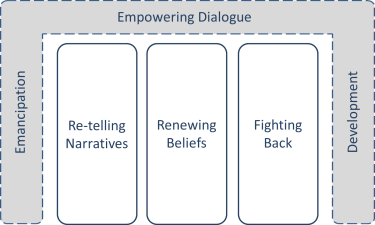
Every coaching journey is unique. Meanwhile, the CFE framework describes three key moves that take place in parallel during coaching:
The first move is called Re-Telling Narratives: It is about the way we tell our story. In CFE, we start by telling the story, telling it as it is in reality not as we were taught to present it, naming oppression and exposing it. Telling the story is already a huge step that many people don’t manage to do on their own, but throughout the coaching journey, the coachee also engages in re-telling the story, transforming a narrative of oppression to a narrative of liberation, integrating new understandings of the past and new determinations for the future. This part of the journey is imaginative and emotional.
The second move is called Renewing Beliefs: It is about the way we understand ourselves and the world. In CFE, the coachee learns how to reflect critically on his/her assumptions and beliefs, also to reflect on the way society affects those assumptions and beliefs. The coachee evaluates the meaning she attributes to different experiences and situations from daily life, and understands how the way we are affected by our beliefs. This part of the journey is reflective and rational.
The third move is called Fighting Back: It is about taking action to change our lives and our world. In CFE, it is not enough to talk or think about our life, because learning does not take place in isolation from the daily reality. So coachees engage with the world, take action to change things positively for themselves, sometimes they take action to experiment with a new behaviour, or in a new environment, sometimes they take action to escape from the cycle of oppression, and sometimes to confront it and change it. In all cases, action does not only drive change but also new learning. This part of the journey is dynamic and outward looking.
The above three moves take place in parallel, they overlap and feed on each other. During a coaching journey, the coachee is fully empowered to decide where to go next, but is also challenged to be critical and to try to see things in a new way.
CFE involves dialogue, exercises, drama games, and many other techniques. An average journey takes place over 6 months, in monthly or fortnightly sessions.
Being a coach is amazing. Touching people lives, and supporting their growth is a very fulfilling experience. It requires personal readiness and a considerable amount of commitment to a learning and reflective journey.
To become a CFE coach, you need to have a deep interest in listening, understanding and supporting others. You need to have tolerance towards different lifestyles and choices, and you need to be critically reflective. To become a coach involves discipline, commitment to an ethical framework, and maintaining a relationship with a supervisor all the time you’re coaching others.
Click here to see some of our coaches profiles
Contact Us to get more information
OR
Fill an application form to attend a training
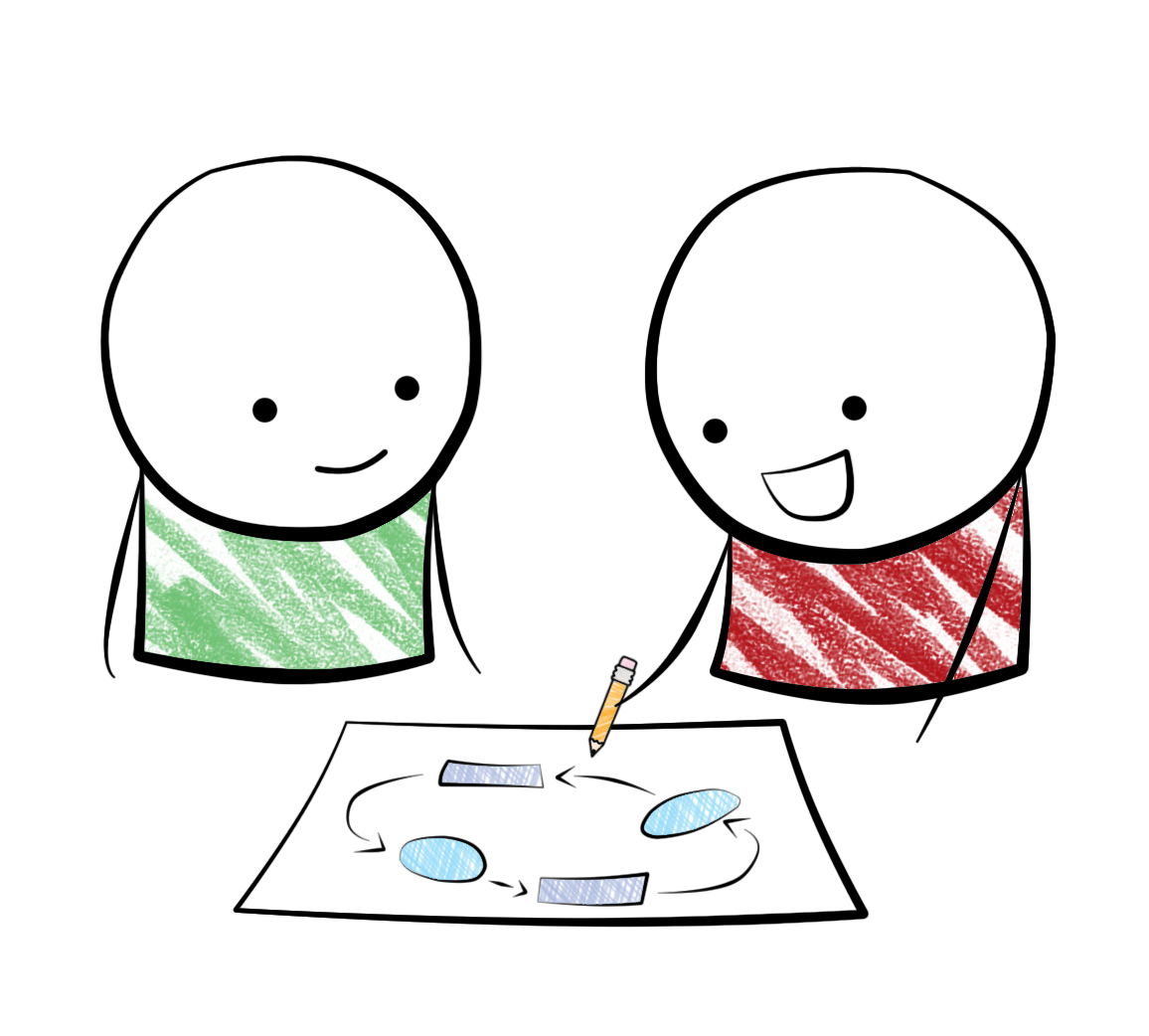 Coaching is a process where a coach supports the learning, development and goal achievement of a person or group. Coaching is based on a relation between equals, engaged in dialogue, reflecting on the present, and planning the future. It is a relationship where one dedicates time and attention to support the other, using a broad arsenal of tools and techniques.
Coaching is a process where a coach supports the learning, development and goal achievement of a person or group. Coaching is based on a relation between equals, engaged in dialogue, reflecting on the present, and planning the future. It is a relationship where one dedicates time and attention to support the other, using a broad arsenal of tools and techniques.
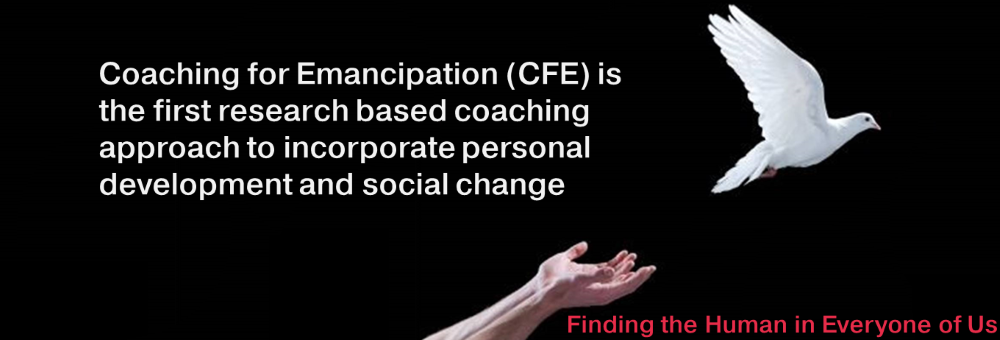
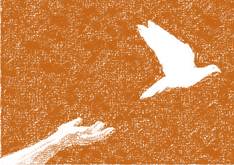 Coaching for Emancipation (CFE) is a specific framework or genre of coaching. Like other forms of coaching, it seeks to support the individual in a positive way. Meanwhile, it does so by supporting a transformative and liberating journey that touches the way the individual understands herself and the world, and the way he/she acts in the world.
Coaching for Emancipation (CFE) is a specific framework or genre of coaching. Like other forms of coaching, it seeks to support the individual in a positive way. Meanwhile, it does so by supporting a transformative and liberating journey that touches the way the individual understands herself and the world, and the way he/she acts in the world.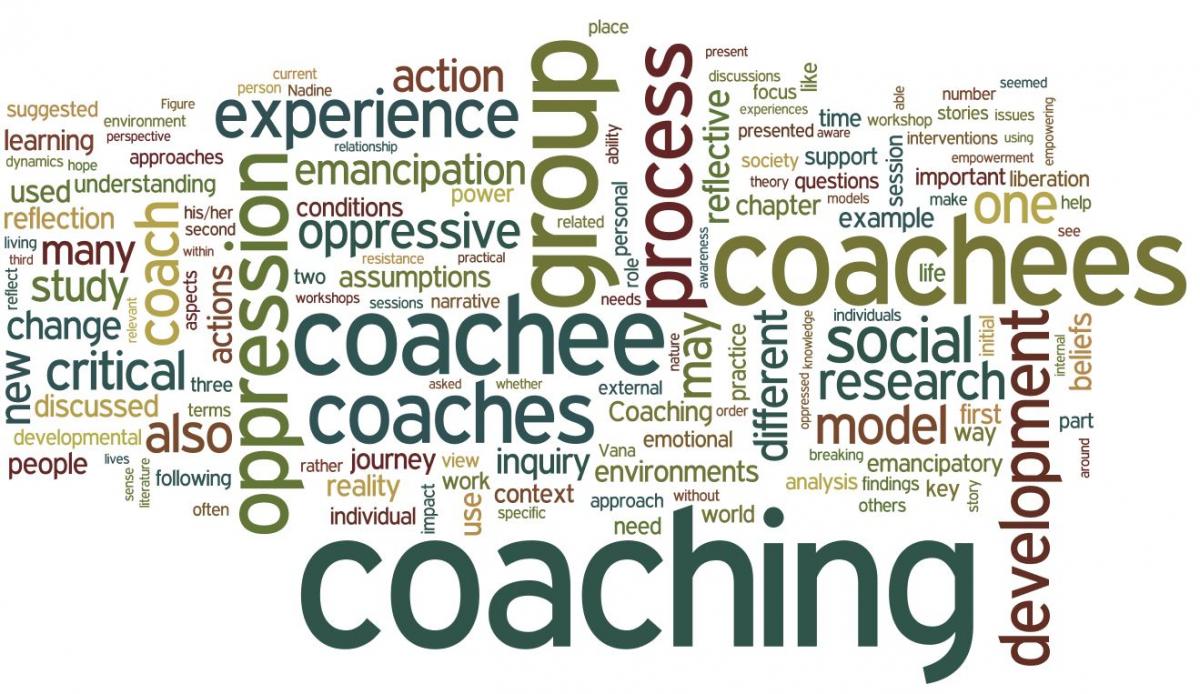 Coaching for Emancipation (CFE) has been developed by Hany Shoukry in 2010. Dr. Shoukry has noticed that many of the theories and methods of human development that originated in Western developed countries fail to achieve an improvement in individuals’ lives, when applied in environments that suffer from injustice, discrimination, or other forms of oppression (Including minority and disadvantaged groups in developed countries). He argued that living in an oppressive environment creates different challenges for self-development, and that these challenges need specific theories and methods to deal with them. A similar concept has been proposed in other disciplines like education, psychotherapy and even theatre.
Coaching for Emancipation (CFE) has been developed by Hany Shoukry in 2010. Dr. Shoukry has noticed that many of the theories and methods of human development that originated in Western developed countries fail to achieve an improvement in individuals’ lives, when applied in environments that suffer from injustice, discrimination, or other forms of oppression (Including minority and disadvantaged groups in developed countries). He argued that living in an oppressive environment creates different challenges for self-development, and that these challenges need specific theories and methods to deal with them. A similar concept has been proposed in other disciplines like education, psychotherapy and even theatre.
 Being a coach is amazing. Touching people lives, and supporting their growth is a very fulfilling experience. It requires personal readiness and a considerable amount of commitment to a learning and reflective journey.
Being a coach is amazing. Touching people lives, and supporting their growth is a very fulfilling experience. It requires personal readiness and a considerable amount of commitment to a learning and reflective journey.